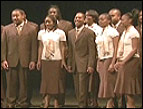The 700 Club with Pat Robertson
- Today's Show
- About The 700 Club
- Previous Shows
- Guest Bios/Interviews
- Amazing Stories
- Bring It On
- In the Green Room
- As Seen On The Club
- Free Recipes / Fact Sheets
- CBN Sports
- Scott Ross
- Program Calendar
- 700 Club Interactive
- 700 Club Classics
- Where To Watch
- Viewer Feedback
- Join The 700 Club

Become a CBN partner and receive The Transforming Word: Verses to Overcome Fear and Experience Peace, our special DVD/CD gift to you.
CBN Partners are making a difference sharing the Gospel of Jesus Christ. Find out how.
What Our Partners Are Doing
What You Can Do
Products Seen on The Club
interview
The Next Generation of African Jubilee
By Cynthia Savage with Mia Evans
The 700 Club
CBN.com – This ensemble, Fisk Jubilee Singers has one of the richest histories in America. Recently, The 700 Club’s Mia Evans sat down with the group to discuss their rich history and present popularity.
Mia Evans (reporting): Was the audition tough?
Pierre: It was tough. I was so nervous.
These are the Fisk Jubilee Singers. In 1866, right after the civil war, Fisk University was formed to make higher education available to all, regardless of race. But by 1871, the university was in dire need of funding to keep its doors open. George White, the music director, had a risky idea. He took the Fisk Jubilee Singers on tour to raise support for the school.
Kwami: It was a time when people did not believe that African Americans could sing. There were places where they were not given food to eat. There were places where they did not have places to sleep. But the fortunate thing was that they did not give up. They were very strong people that knew they had a mission.
Before long, their powerful performances won the hearts of their audiences. They toured across the United States and Europe. They even performed before Queen Victoria.
Jubilee Hall was built as a result of their success. This is the south’s first permanent structure built for the education of black students. Their actions not only preserved their university but also introduced the world to Negro spirituals. Seven of the nine original Jubilee singers were former slaves. The songs that African Americans sang for generations in the fields and behind closed doors were made public.
Mia: Why is it important today to continue this tradition of keeping Negro spirituals alive into the next generation and the next generation?
Kwami: It is a very unique form of music thinking of the fact that it was created by slaves who did not have any formal musical training. We know that slaves used this music to express their emotions and to communicate with each other. But more importantly for me personally today is that the Negro spiritual is more than just slave songs or plantation songs. The Negro spiritual today for me and my students have become a source of inspiration, spiritual inspiration.
Pierre: It’s like a testimony that needs to be passed down from generation to generation, so that we won’t forget. And it serves as an encouragement for generations to come.
Ereka Thompson: I’m continuing a legacy. These songs are so powerful, and God uses us to send a message … to not give up and to keep going. And, to always believe that you have a purpose and that you can make a difference.
Kwami: I’d always like the audiences to come to realize that it’s good to live by faith. It’s good to walk in love. It’s good to seek the peace of God, and it’s always good to stand still and know that God is God. Those are things I’d like people to experience when we perform the Negro spirituals.
Are you seeking answers in life? Are you hurting?
Are you facing a difficult situation?
- Find your way to peace with God
- Send us your prayer request online
- Call The 700 Club Prayer Center at 1 (800) 700-7000, 24 hours a day.
A caring friend will be there to pray with you in your time of need.


